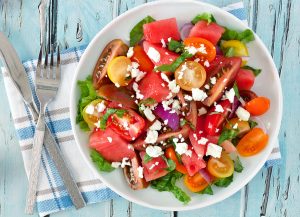11 Jul Healthy Diet and Healthy Skin
There’s a saying that we are what we eat, and increasingly scientists are proving that our diet has a significant impact on the way our bodies look and function. Food provides the fuel for our cells, the protein to rebuild tissue, and the vitamins and minerals to facilitate essential processes.
You may be aware that too much fast food, saturated fat, salt and sugar can affect your cardiovascular and digestive systems. But a poor diet doesn’t just affect your inner health, it can also cause problems with your skin. There is a strong link between nutrition and skin condition. Beauty really does come from within.
The Mediterranean Diet
The Mediterranean Diet is being increasingly recommended as a way of boosting health. Sadly, it’s not about piles of pasta, pizza and gelato – instead, it focuses on fresh seasonal produce, fresh fruits and vegetables, lean protein, whole grains and healthy fats.
The Mediterranean diet doesn’t just taste delicious, it’s good for the body too. It offers benefits that go beyond maintaining a healthy weight, with studies showing that people who follow this way of eating have a lower risk of getting heart disease, depression and dementia.
The Mediterranean Diet contains high levels of healthy fats, vitamins and minerals, which are great for skin health, helping reduce the symptoms of eczema and even keeping people genetically younger.
Choose:
Poultry, fish, seafood and eggs
Fruit and vegetables, choose a rainbow coloured selection for maximum micronutrient punch
Whole grains
Legumes, nuts and seeds
Healthy fats, such as olive oil or avocado
Herbs and spices
Dairy produce in moderation only, preferably choosing cultured milk products like kefir, yogurt or ricotta
A little wine, in moderation
Cut down on:
Processed food
Red meat – only have it a few times a month
Salt
Saturated fats from butter and cheese
Refined carbs like white bread and pasta, choose wholegrains if possible
Dry skin conditions
With dry skin conditions, such as eczema, emollients provide the cornerstones of treatment. However, it is also important to moisturise from the inside. Since the seventies, a low-fat diet has been advocated, with fats and oils being labelled as food baddies. However, there is increasing awareness that some fats are vital for healthy function, especially the essential fatty acids that our bodies are unable to produce.
Omega 3 fatty acids are particularly important to maintain healthy skin. Inadequate intake can increase the risk of your skin becoming tight, dry, irritated and itchy. So, keep on applying emollients regularly, but also tuck into oily fish like salmon, tuna and sardines as well as nuts, seeds, green leafy vegetables and soya.
Acne
For years, any association between spots and dietary factors was dismissed as a myth. Chocolate? Not guilty! Too many takeaways? Not to blame. But, many people have noticed that modifying their diet can have an effect on their acne. In particular, the impact of cutting out sugar or excluding dairy products have proved promising, both anecdotally and in initial studies. It makes sense that eating a healthy diet will nourish the skin and decrease inflammation. Research suggests that a balanced diet rich in vitamins and minerals can help people who suffer from the misery of acne.
Skin aging
Research confirms that a diet packed with plenty of fruit, vegetables and healthy fats may be the safest and healthiest method of maintaining youthful looking skin. Omega-rich flaxseeds can help with skin hydration and reduce irritation, which may improve the appearance of wrinkles. Antioxidants and natural chemicals called polyphenols may offer some natural protection against sun-damage.
Skin cancer
Although sun exposure is the most important risk factor for developing melanoma (the most serious form of skin cancer) your diet can also have an impact. In research studies, people who regularly ate citrus fruit, green leafy vegetables, fresh herbs and oily fish were significantly less likely to develop skin cancer.
It’s all because of antioxidants, which are chemicals in our food that protect our cells from damage by oxygen-rich molecules, called free radicals. Micronutrients, including Vitamins A, C and E and beta carotene, work to ‘mop-up’ these potentially dangerous substances. They’re found in fruit, vegetables, nuts and fish – key components of the Mediterranean Diet.
This Mediterranean way of eating is not about deprivation; it’s about enjoying good food and nourishing your body. Hippocrates said, “Let food be thy medicine” – by eating well you can feel good and look good too.



Sorry, the comment form is closed at this time.